Unit10 You’re supposed to shake hands大单元教材分析人教新目标九年级英语全册
文档属性
| 名称 | Unit10 You’re supposed to shake hands大单元教材分析人教新目标九年级英语全册 | 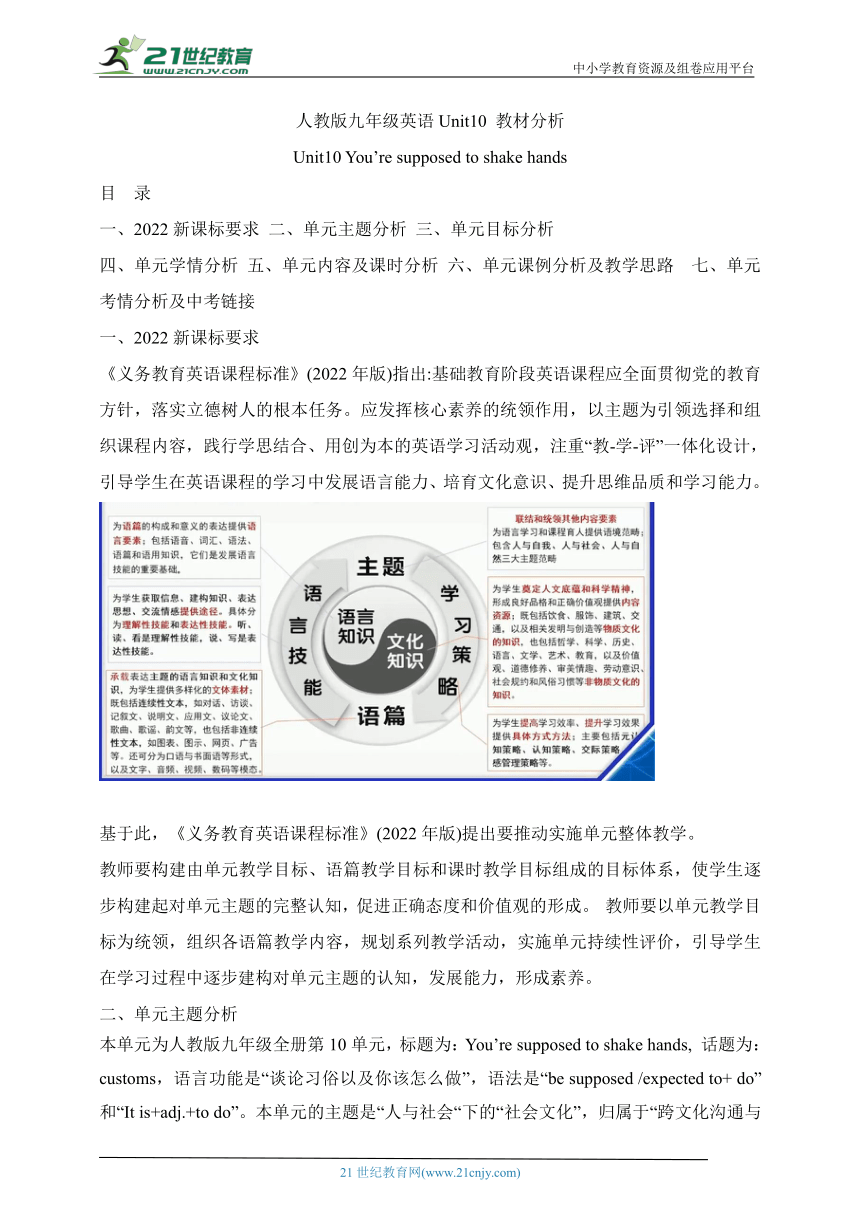 | |
| 格式 | docx | ||
| 文件大小 | 2.2MB | ||
| 资源类型 | 试卷 | ||
| 版本资源 | 人教新目标(Go for it)版 | ||
| 科目 | 英语 | ||
| 更新时间 | 2025-06-19 08:07:05 | ||
图片预览

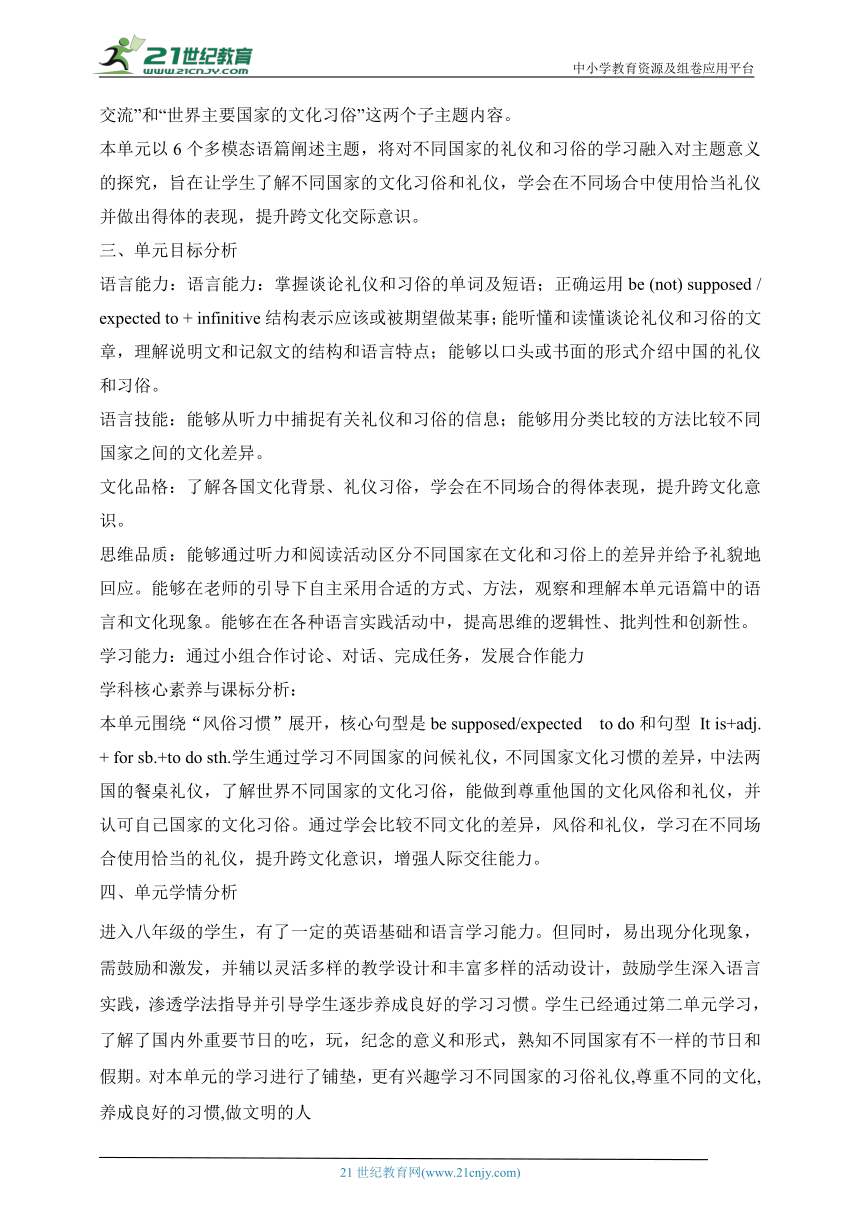
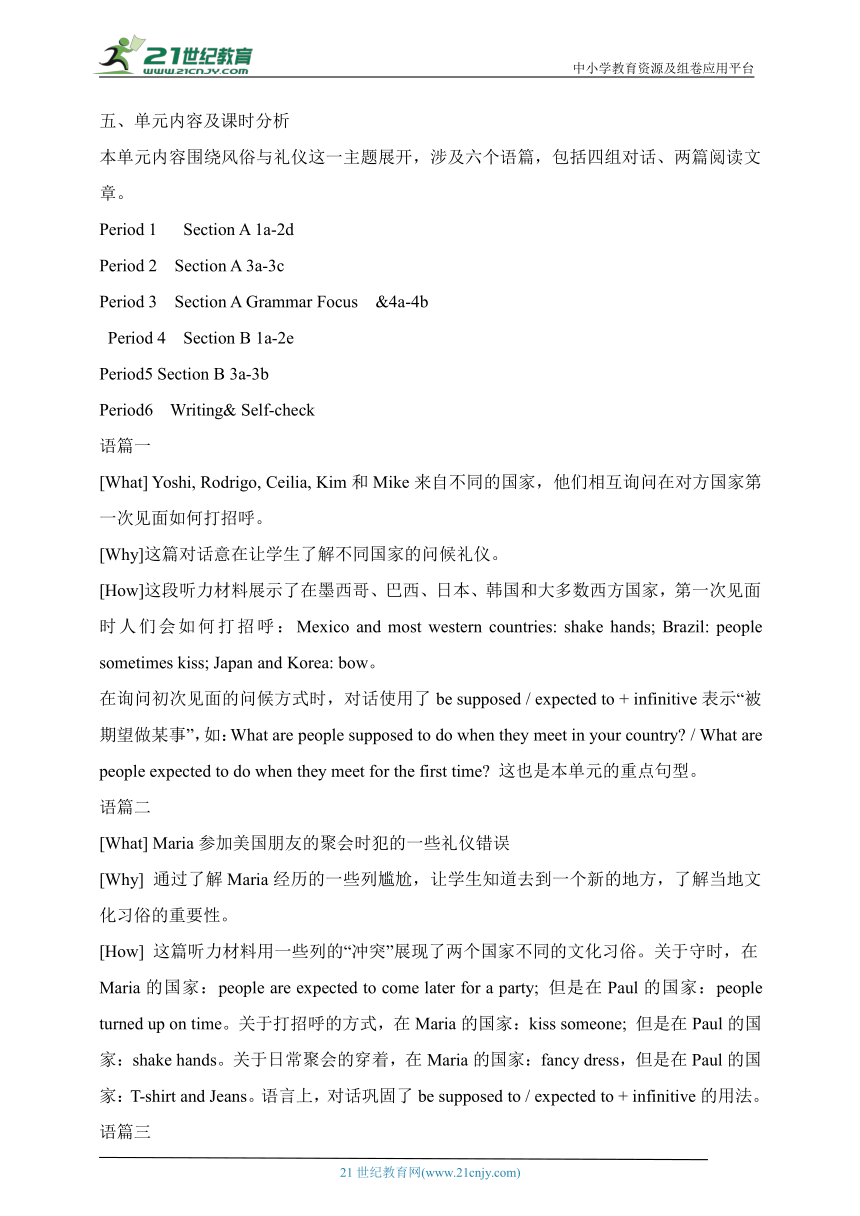
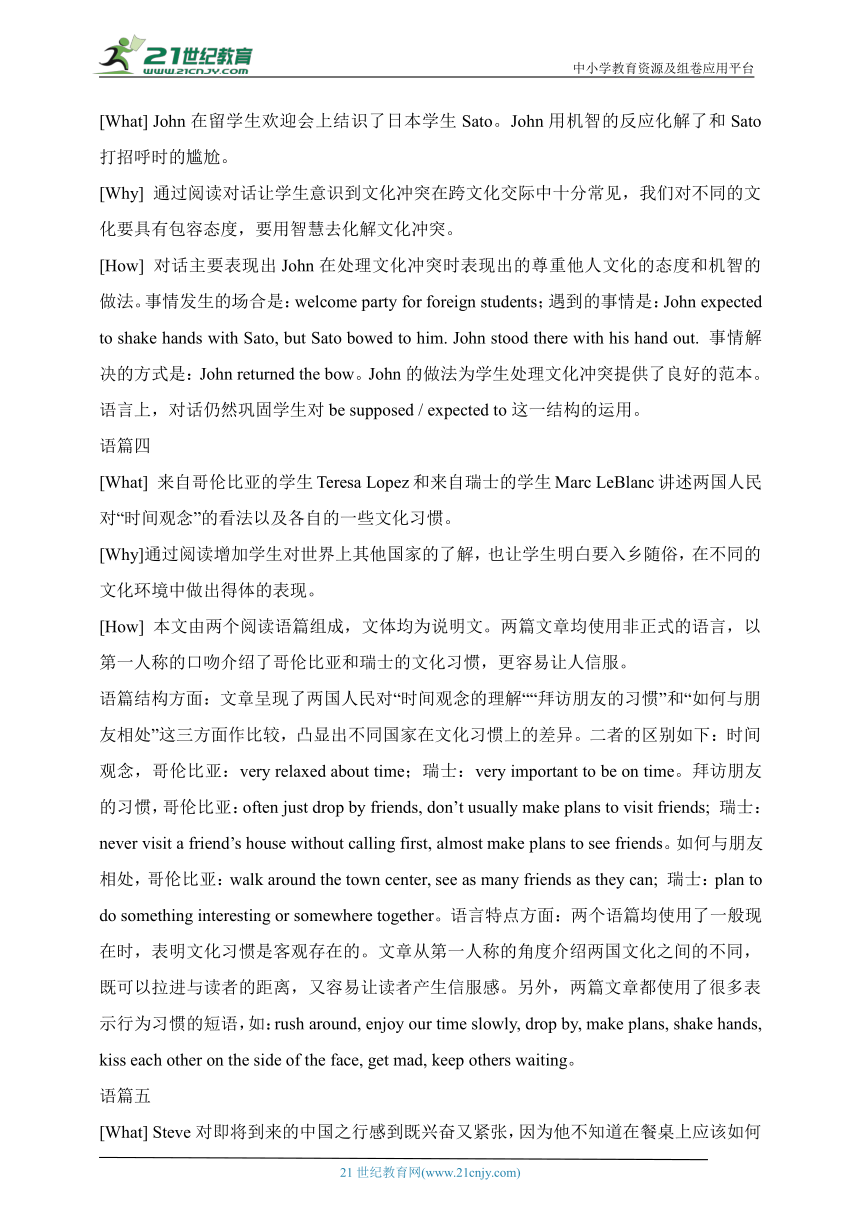
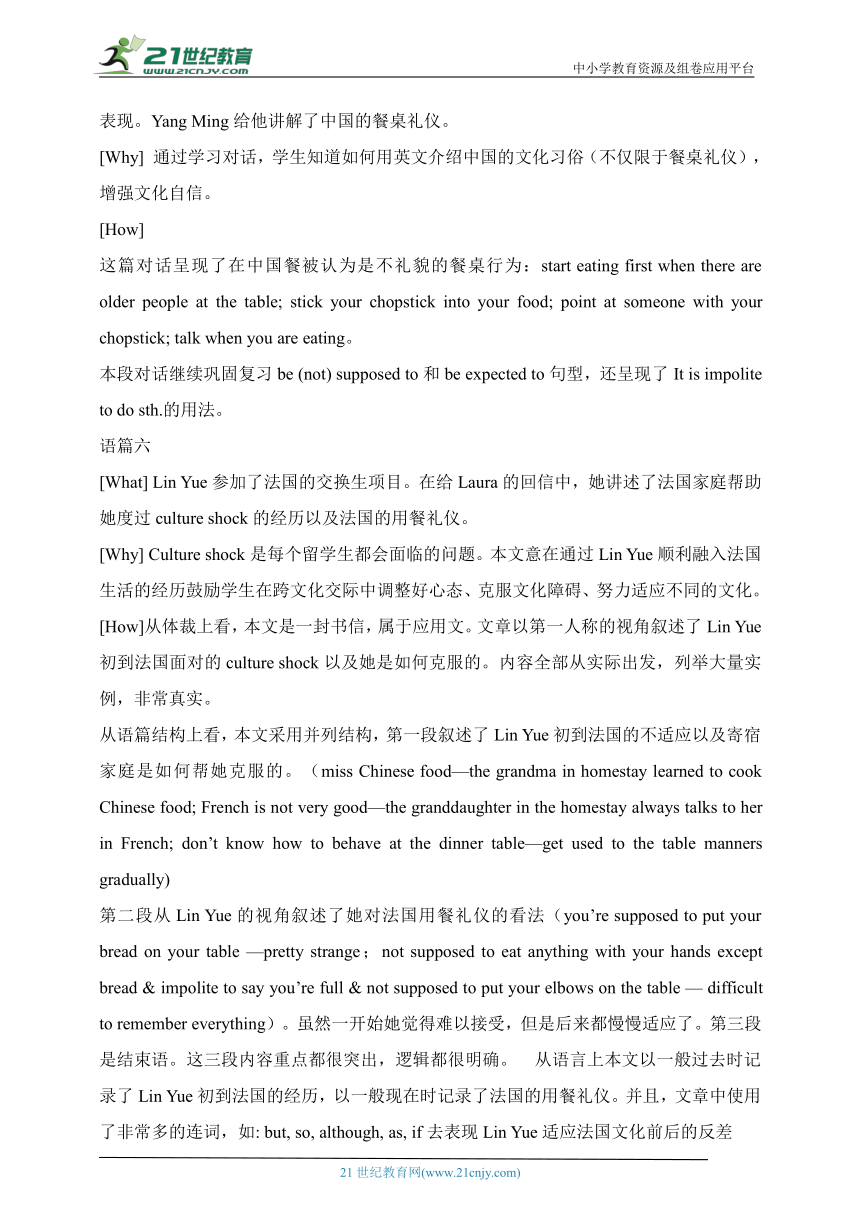
文档简介
中小学教育资源及组卷应用平台
人教版九年级英语Unit10 教材分析
Unit10 You’re supposed to shake hands
目 录
一、2022新课标要求 二、单元主题分析 三、单元目标分析
四、单元学情分析 五、单元内容及课时分析 六、单元课例分析及教学思路 七、单元考情分析及中考链接
一、2022新课标要求
《义务教育英语课程标准》(2022年版)指出:基础教育阶段英语课程应全面贯彻党的教育方针,落实立德树人的根本任务。应发挥核心素养的统领作用,以主题为引领选择和组织课程内容,践行学思结合、用创为本的英语学习活动观,注重“教-学-评”一体化设计,引导学生在英语课程的学习中发展语言能力、培育文化意识、提升思维品质和学习能力。
基于此,《义务教育英语课程标准》(2022年版)提出要推动实施单元整体教学。
教师要构建由单元教学目标、语篇教学目标和课时教学目标组成的目标体系,使学生逐步构建起对单元主题的完整认知,促进正确态度和价值观的形成。 教师要以单元教学目标为统领,组织各语篇教学内容,规划系列教学活动,实施单元持续性评价,引导学生在学习过程中逐步建构对单元主题的认知,发展能力,形成素养。
二、单元主题分析
本单元为人教版九年级全册第10单元,标题为:You’re supposed to shake hands, 话题为:customs,语言功能是“谈论习俗以及你该怎么做”,语法是“be supposed /expected to+ do”和“It is+adj.+to do”。本单元的主题是“人与社会“下的“社会文化”,归属于“跨文化沟通与交流”和“世界主要国家的文化习俗”这两个子主题内容。
本单元以6个多模态语篇阐述主题,将对不同国家的礼仪和习俗的学习融入对主题意义的探究,旨在让学生了解不同国家的文化习俗和礼仪,学会在不同场合中使用恰当礼仪并做出得体的表现,提升跨文化交际意识。
三、单元目标分析
语言能力:语言能力:掌握谈论礼仪和习俗的单词及短语;正确运用be (not) supposed / expected to + infinitive结构表示应该或被期望做某事;能听懂和读懂谈论礼仪和习俗的文章,理解说明文和记叙文的结构和语言特点;能够以口头或书面的形式介绍中国的礼仪和习俗。
语言技能:能够从听力中捕捉有关礼仪和习俗的信息;能够用分类比较的方法比较不同国家之间的文化差异。
文化品格:了解各国文化背景、礼仪习俗,学会在不同场合的得体表现,提升跨文化意识。
思维品质:能够通过听力和阅读活动区分不同国家在文化和习俗上的差异并给予礼貌地回应。能够在老师的引导下自主采用合适的方式、方法,观察和理解本单元语篇中的语言和文化现象。能够在在各种语言实践活动中,提高思维的逻辑性、批判性和创新性。
学习能力:通过小组合作讨论、对话、完成任务,发展合作能力
学科核心素养与课标分析:
本单元围绕“风俗习惯”展开,核心句型是be supposed/expected to do和句型 It is+adj. + for sb.+to do sth.学生通过学习不同国家的问候礼仪,不同国家文化习惯的差异,中法两国的餐桌礼仪,了解世界不同国家的文化习俗,能做到尊重他国的文化风俗和礼仪,并认可自己国家的文化习俗。通过学会比较不同文化的差异,风俗和礼仪,学习在不同场合使用恰当的礼仪,提升跨文化意识,增强人际交往能力。
四、单元学情分析
进入八年级的学生,有了一定的英语基础和语言学习能力。但同时,易出现分化现象,需鼓励和激发,并辅以灵活多样的教学设计和丰富多样的活动设计,鼓励学生深入语言实践,渗透学法指导并引导学生逐步养成良好的学习习惯。学生已经通过第二单元学习,了解了国内外重要节日的吃,玩,纪念的意义和形式,熟知不同国家有不一样的节日和假期。对本单元的学习进行了铺垫,更有兴趣学习不同国家的习俗礼仪,尊重不同的文化,养成良好的习惯,做文明的人
五、单元内容及课时分析
本单元内容围绕风俗与礼仪这一主题展开,涉及六个语篇,包括四组对话、两篇阅读文章。
Period 1 Section A 1a-2d
Period 2 Section A 3a-3c
Period 3 Section A Grammar Focus &4a-4b
Period 4 Section B 1a-2e
Period5 Section B 3a-3b
Period6 Writing& Self-check
语篇一
[What] Yoshi, Rodrigo, Ceilia, Kim和Mike来自不同的国家,他们相互询问在对方国家第一次见面如何打招呼。
[Why]这篇对话意在让学生了解不同国家的问候礼仪。
[How]这段听力材料展示了在墨西哥、巴西、日本、韩国和大多数西方国家,第一次见面时人们会如何打招呼:Mexico and most western countries: shake hands; Brazil: people sometimes kiss; Japan and Korea: bow。
在询问初次见面的问候方式时,对话使用了be supposed / expected to + infinitive表示“被期望做某事”,如:What are people supposed to do when they meet in your country / What are people expected to do when they meet for the first time 这也是本单元的重点句型。
语篇二
[What] Maria参加美国朋友的聚会时犯的一些礼仪错误
[Why] 通过了解Maria经历的一些列尴尬,让学生知道去到一个新的地方,了解当地文化习俗的重要性。
[How] 这篇听力材料用一些列的“冲突”展现了两个国家不同的文化习俗。关于守时,在Maria的国家:people are expected to come later for a party; 但是在Paul的国家:people turned up on time。关于打招呼的方式,在Maria的国家:kiss someone; 但是在Paul的国家:shake hands。关于日常聚会的穿着,在Maria的国家:fancy dress,但是在Paul的国家:T-shirt and Jeans。语言上,对话巩固了be supposed to / expected to + infinitive的用法。
语篇三
[What] John在留学生欢迎会上结识了日本学生Sato。John用机智的反应化解了和Sato打招呼时的尴尬。
[Why] 通过阅读对话让学生意识到文化冲突在跨文化交际中十分常见,我们对不同的文化要具有包容态度,要用智慧去化解文化冲突。
[How] 对话主要表现出John在处理文化冲突时表现出的尊重他人文化的态度和机智的做法。事情发生的场合是:welcome party for foreign students;遇到的事情是:John expected to shake hands with Sato, but Sato bowed to him. John stood there with his hand out. 事情解决的方式是:John returned the bow。John的做法为学生处理文化冲突提供了良好的范本。语言上,对话仍然巩固学生对be supposed / expected to这一结构的运用。
语篇四
[What] 来自哥伦比亚的学生Teresa Lopez和来自瑞士的学生Marc LeBlanc讲述两国人民对“时间观念”的看法以及各自的一些文化习惯。
[Why]通过阅读增加学生对世界上其他国家的了解,也让学生明白要入乡随俗,在不同的文化环境中做出得体的表现。
[How] 本文由两个阅读语篇组成,文体均为说明文。两篇文章均使用非正式的语言,以第一人称的口吻介绍了哥伦比亚和瑞士的文化习惯,更容易让人信服。
语篇结构方面:文章呈现了两国人民对“时间观念的理解““拜访朋友的习惯”和“如何与朋友相处”这三方面作比较,凸显出不同国家在文化习惯上的差异。二者的区别如下:时间观念,哥伦比亚:very relaxed about time;瑞士:very important to be on time。拜访朋友的习惯,哥伦比亚:often just drop by friends, don’t usually make plans to visit friends; 瑞士:never visit a friend’s house without calling first, almost make plans to see friends。如何与朋友相处,哥伦比亚:walk around the town center, see as many friends as they can; 瑞士:plan to do something interesting or somewhere together。语言特点方面:两个语篇均使用了一般现在时,表明文化习惯是客观存在的。文章从第一人称的角度介绍两国文化之间的不同,既可以拉进与读者的距离,又容易让读者产生信服感。另外,两篇文章都使用了很多表示行为习惯的短语,如:rush around, enjoy our time slowly, drop by, make plans, shake hands, kiss each other on the side of the face, get mad, keep others waiting。
语篇五
[What] Steve对即将到来的中国之行感到既兴奋又紧张,因为他不知道在餐桌上应该如何表现。Yang Ming给他讲解了中国的餐桌礼仪。
[Why] 通过学习对话,学生知道如何用英文介绍中国的文化习俗(不仅限于餐桌礼仪),增强文化自信。
[How]
这篇对话呈现了在中国餐被认为是不礼貌的餐桌行为:start eating first when there are older people at the table; stick your chopstick into your food; point at someone with your chopstick; talk when you are eating。
本段对话继续巩固复习be (not) supposed to和be expected to句型,还呈现了It is impolite to do sth.的用法。
语篇六
[What] Lin Yue参加了法国的交换生项目。在给Laura的回信中,她讲述了法国家庭帮助她度过culture shock的经历以及法国的用餐礼仪。
[Why] Culture shock是每个留学生都会面临的问题。本文意在通过Lin Yue顺利融入法国生活的经历鼓励学生在跨文化交际中调整好心态、克服文化障碍、努力适应不同的文化。
[How]从体裁上看,本文是一封书信,属于应用文。文章以第一人称的视角叙述了Lin Yue初到法国面对的culture shock以及她是如何克服的。内容全部从实际出发,列举大量实例,非常真实。
从语篇结构上看,本文采用并列结构,第一段叙述了Lin Yue初到法国的不适应以及寄宿家庭是如何帮她克服的。(miss Chinese food—the grandma in homestay learned to cook Chinese food; French is not very good—the granddaughter in the homestay always talks to her in French; don’t know how to behave at the dinner table—get used to the table manners gradually)
第二段从Lin Yue的视角叙述了她对法国用餐礼仪的看法(you’re supposed to put your bread on your table —pretty strange;not supposed to eat anything with your hands except bread & impolite to say you’re full & not supposed to put your elbows on the table — difficult to remember everything)。虽然一开始她觉得难以接受,但是后来都慢慢适应了。第三段是结束语。这三段内容重点都很突出,逻辑都很明确。 从语言上本文以一般过去时记录了Lin Yue初到法国的经历,以一般现在时记录了法国的用餐礼仪。并且,文章中使用了非常多的连词,如: but, so, although, as, if去表现Lin Yue适应法国文化前后的反差
六、单元课例分析及教学思路
以听说课第一课时为例
Learning Objectives
To learn something about what people do when they meet for the first time.
To learn to use be supposed + to do to talk about what you should do.
To learn some new words and expressions: custom, bow, kiss, shake hands, make mistakes, as soon as......
Lead-in
Free talk
Do you know how to greet foreigners
What kinds of greeting manners are mentioned in the video
Listening 1b
1. What are they talking about
2. What do people do when they meet for the first time Match the countries with the customs.
3.Listen again and fill in the blanks and read.
Yoshi: What are people__________ to do when they meet in your country, Rodrigo
Rodrigo: Do you _______ when people meet for the first time
Yoshi : Yeah.
Rodrigo: In Mexico, we ______________.
Yoshi : What about in Brazil, Celia
Celia: Well, in Brazil, people sometimes_____. How about in Japan, Yoshi
What are people ___________to do when they meet for the first time
Yoshi : We ______.
Kim: And in __________we also bow.
Mike: Well, I guess in most ___________________we shake hands.
Listening 2a and 2b
1. What are they talking about
2. Maria is an exchange student. Last night she had dinner at an American friend’s house. Listen and check (√) the mistakes Maria made.
______ arrived late
______ ate the wrong food
______ greeted Paul’s mother the wrong way
______ wore the wrong clothes
3.Listen again. Fill in the blanks.
1).Maria was supposed to arrive at 7:00, but she _____________.
2). In Maria’s country, when you’re invited for 7:00, you’re expected to ___________.
3). When Maria met Paul’s mom, she was supposed to ___________.
4). Maria should ask what she is supposed to_______ if she is invited to a party next time.
4.Follow the tape and read the conversation.
Group work
Give a report
People in different countries greet each other differently.
In Korea, people are supposed to ______.However, people in _________ are expected to ____________________.It’s important to learn greeting manners in different countries, and please remember that when in Rome, do as the Romans do. (入乡随俗)
板书设计:
单元教学思路:
思路一听说课:本单元的功能与话题部分内容,与学生实际生活紧密联系,围绕“风俗习惯,餐桌礼仪”这个语言功能项目, 通过观看视频或谈论生活中不同国家的风俗习惯引出这一话题。采用合作探究学习的方式,巧妙设计的各项听说任务活动,通过结对练习、小组讨论、角色表演等形式进行大量的听力和口语交际活动。要求学生能在创设的情境中反复运用目标语言,了解不同国家的问候礼仪,风俗习惯,餐桌礼仪。
思路二语法课:对本单元的语法教学,采用情景教学法,设置情景呈现单元语法结构 be supposed/expected to do和句型 It is+adj. + for sb.+to do sth,采用合作探究学习、小组讨论等方式,训练目标语言和语法结构。
思路三阅读课:本单元阅读教学有两个重点:1.运用阅读技巧快速完成阅读,通过思维导图复述整篇文章。2.通过学习做笔记和要点归纳的方式加强语言记忆,学会由短时记忆过渡到长期记忆的策略,提高学习效率。
首先,要求学生能够根据图片、标题大胆预测文章所要讲述的内容。然后要求学生利用短文中的关键词,迅速把握文章的结构框架。接着通过分段详细阅读了解不同国家文化习惯的差异,并学习在不同场合使用恰当的礼仪。阅读过程中注意对学生进行阅读策略的引导,帮助他们运用prediction、skim、scan等各种阅读技巧理解短文内容,提高阅读能力。
思路四 写作课:本单元的话题作文为风俗习惯,餐桌礼仪,学生通过整个单元内容的学习通过结对练习、小组讨论、角色表演等形式复习并总结不同国家的风俗习惯和礼仪,然后运用重点单词短语来组词成句,并且有逻辑地组句成篇。
七、单元考情分析及中考链接
本单元涉及的主要内容是be(not)supposed/expected to do 和It’s+adj.+for sb.+to do sth.的用法以及重点单词短语的用法。考查题型通常是以完形填空, 语法填空,单词填空等形式为主。近5年在日照、滨州、枣庄,烟台以及省外其它地市中考题中均有考察。其中话题作文礼貌、礼仪,风俗习惯也是中考考查的重点 。在2022年北京,枣庄,黑龙江中考题中都考察了这一话题。
1.重点单词:relaxed,value,capital,passport,northern,season , worth,manner,empty,exchange,behave, except, suggestion
2.重点短语:take off,after all,get mad,make an effort ,clean …off,go out of one’s way ,make …feel at home,get used to
2.重点句型:You are (not)supposed / expected to ...
You should/shouldn’t...
You are not allowed to ...
It's important / polite / impolite /rude to ...
【考点一】It's+adj.+for sb.+to do sth.用法
中考链接
1. Yesterday, as I was coming near the front door of our public library, a white haired gentleman stepped back __71_________(hold) the door for me. With a stick in my hand, it is not strange __72_______ people to do so.
【考点二】suppose用法
中考链接
1. We are s_______ to behave properly in public places.
【考点三】except的用法
中考链接
1. The shop is open every day e________ Sundays.
2. We all volunteered on the farm e________ Tom, who was ill at home.
3. My parents are busy and they work every day _______(除了)Sunday
4.Our school library is open every day ________ Sundays. In this way, the librarians can have a day off per week.
【考点四】worth的用法
中考链接
1. —Is anything worth ________(see) in Xi'an
—Yes. Don't miss the amazing Terracotta Army.
2. The doctor’s advice on keeping healthy is __________taking
3.The film Born to Fly is well w________ watching. You can’t miss it.
【考点五】suggestion的用法
中考链接
If you want to take care of your teeth, please follow the five __________(suggestion) below
2. My friend gave me some a__________ on how to keep a pet.
【考点六】take off 的用法
take off 脱下 2. take off 起飞,离开
2.关于take的短语: take part in 参加 (菏泽:2020 .26) take after (外貌,行为 )像 take place 发生 take bake 带回 take action 采取行动 take one’s place 代替
3.关于 off 的短语 give off 发出,放出(光、热等) show off炫耀 go off (闹钟)发出响声;离开 drive off驱车离去 fall off跌落 get off下车 set off出发;动身 see sb. off为某人送行 break off中止;弄断 put off推迟 shut off关闭;停止运转 turn off关掉(水,电,气等) kick sb. off开除某人 clean...off把……擦掉 pay off偿清(欠款等);成功 cut off切掉;剪掉;中断(水源、电源等)
中考链接
1. ---Tom, it smells so terrible here.
---Sorry , mom I will ______my socks and wash them right away.
A . put off B. take off C. turn off D. cut off
习题精炼
1.Be r________. Don't push yourself so hard.
2. Don't be so rude. You should ________(表现)like a gentleman.
3. It's one of the good table __________(礼仪) in China to ask the old to eat first.
4. We can’t just waste food when half the world is still h___________.
5. Mum, I am so _______ (饥饿的). Let’s make dinner together!
6. I like autumn best because I think it’s the most beautiful ________ (季节) in a year.
7.—What’s your favorite ________
—Winter. I can make a snowman.
A.subject B.season C.animal D.sport
话题作文---中考链接
假定你是李华,你的英国笔友Chris对中国文化很感兴趣,他给你发来邮件,询问中国人日常生活中的基本社交礼仪,如待人接物、餐桌礼仪等。请你用英语回复一封邮件,介绍你所知道的相关礼仪。
提示词语:manners, shake hands, polite, gift, chopsticks
提示问题: What do we do when we meet people for the first time
How do we behave properly at table
Dear Chris,
I’m glad to know that you’re interested in Chinese social manners. China is a country with a long history, so there are many customs here. Let me tell you some of them.
Firstly, you are supposed to shake hands when you meet someone for the first time. Secondly, you should bring a gift when you are invited to a party and be sure to arrive on time or a few minutes earlier. Thirdly, when you eat meals with others, it’s rude to point at others with your chopsticks. And don’t make noise when you have your soup.
I hope the above is helpful. Please feel free to ask for more information.
Your’ s
Li Hua
假如你是李华,你的笔友Mark将要来你家做客,向你寻问如何在中国举止得当。请根据下面的提示,给Mark写一封80~100词的回信。把答案写在答题卡上相应位置。(可能用到的单词:chopsticks筷子)
见面礼仪。 2. 餐桌礼仪。 3. 外出礼仪。
Dear Mark,
I am glad to hear that you are coming to China soon. I’d like to give you some suggestions on how to behave properly in China.
When you come to my house, you need to buy some small gifts, such as some fruit. This is the basic etiquette for Chinese guests when they visit others. When you are eating with us, you should let the elders move their chopsticks first before we eat. Don’t make too much noise while eating. It’s impolite to point at others with your chopsticks or stick your chopsticks into the food. Before you go outside, you need to say goodbye to others. It’s polite.
A safe trip to you and I hope to meet you soon!
Best wishes, Li Hua
假如你是李华, 你的一位笔友约翰发来一封邮件, 说他下星期来中国,他向你询问中国的餐桌礼仪。请你至少用三种句式写五条中国的餐桌礼仪.
1. In China, you’re not supposed to stick your chopsticks into the food.
2. In China, the youngest person isn’t expected to start eating first.
3. In China, it’s impolite to use your chopsticks to hit an empty bowl.
4. In China, it’s impolite to point at anyone with your chopsticks.
5. In China, you shouldn’t reach across the table to pick certain foods. (合理即可)
话题作文
本单元以“风俗习惯”为话题,围绕这一话题,主要学习各国的不同礼仪,如见面礼仪,餐桌礼仪等。谈论在不同的场合应该做什么,了解不同国家的习俗最能体现本单元话题以及语言运用功能的作为为介绍不同国家的风俗习惯的短文,书信或邮件的写作此类话题作文的常用表达有:
You are (not) supposed / expected to ...
You should...
You are not allowed to ...
It's important / polite / impolite /rude to ...
结构:开篇点题----具体礼仪-----提出希望或给予祝愿
话题预测
假如你叫张峰,你的笔友Paul要来中国学习一段时间,在到中国之前,他想了解中国的风俗习惯。请你给他写封信,讲述一些中国的风俗习惯,告诉他不要紧张。
内容提示:可以从见面问好、餐桌礼仪等方面介绍。开头、结尾已经给出,80~100词。
参考词汇:shake hands握手 table manners餐桌礼仪 pick up one's bowl端起某人的碗 stick... into... 把……插进……
例文:
Dear Paul,
I am glad to know that you are coming to China. Chinese people are very friendly, so you don't have to worry about the customs.
In China, when you meet someone, you are supposed to shake hands. It's important for you to know some table manners. You are supposed to use chopsticks instead of spoon and fork. You are not supposed to pick up you bowl to eat. It's rude to stick your chopsticks into your food. If guests have no food on their plate, it's polite to put food on their plate. People in China and America behave differently at the dinner table. There are many different table manners here. I will tell you more when you come to China.
I am looking forward to seeing you in China.
Yours’
Zhang Li
21世纪教育网 www.21cnjy.com 精品试卷·第 2 页 (共 2 页)
21世纪教育网(www.21cnjy.com)
人教版九年级英语Unit10 教材分析
Unit10 You’re supposed to shake hands
目 录
一、2022新课标要求 二、单元主题分析 三、单元目标分析
四、单元学情分析 五、单元内容及课时分析 六、单元课例分析及教学思路 七、单元考情分析及中考链接
一、2022新课标要求
《义务教育英语课程标准》(2022年版)指出:基础教育阶段英语课程应全面贯彻党的教育方针,落实立德树人的根本任务。应发挥核心素养的统领作用,以主题为引领选择和组织课程内容,践行学思结合、用创为本的英语学习活动观,注重“教-学-评”一体化设计,引导学生在英语课程的学习中发展语言能力、培育文化意识、提升思维品质和学习能力。
基于此,《义务教育英语课程标准》(2022年版)提出要推动实施单元整体教学。
教师要构建由单元教学目标、语篇教学目标和课时教学目标组成的目标体系,使学生逐步构建起对单元主题的完整认知,促进正确态度和价值观的形成。 教师要以单元教学目标为统领,组织各语篇教学内容,规划系列教学活动,实施单元持续性评价,引导学生在学习过程中逐步建构对单元主题的认知,发展能力,形成素养。
二、单元主题分析
本单元为人教版九年级全册第10单元,标题为:You’re supposed to shake hands, 话题为:customs,语言功能是“谈论习俗以及你该怎么做”,语法是“be supposed /expected to+ do”和“It is+adj.+to do”。本单元的主题是“人与社会“下的“社会文化”,归属于“跨文化沟通与交流”和“世界主要国家的文化习俗”这两个子主题内容。
本单元以6个多模态语篇阐述主题,将对不同国家的礼仪和习俗的学习融入对主题意义的探究,旨在让学生了解不同国家的文化习俗和礼仪,学会在不同场合中使用恰当礼仪并做出得体的表现,提升跨文化交际意识。
三、单元目标分析
语言能力:语言能力:掌握谈论礼仪和习俗的单词及短语;正确运用be (not) supposed / expected to + infinitive结构表示应该或被期望做某事;能听懂和读懂谈论礼仪和习俗的文章,理解说明文和记叙文的结构和语言特点;能够以口头或书面的形式介绍中国的礼仪和习俗。
语言技能:能够从听力中捕捉有关礼仪和习俗的信息;能够用分类比较的方法比较不同国家之间的文化差异。
文化品格:了解各国文化背景、礼仪习俗,学会在不同场合的得体表现,提升跨文化意识。
思维品质:能够通过听力和阅读活动区分不同国家在文化和习俗上的差异并给予礼貌地回应。能够在老师的引导下自主采用合适的方式、方法,观察和理解本单元语篇中的语言和文化现象。能够在在各种语言实践活动中,提高思维的逻辑性、批判性和创新性。
学习能力:通过小组合作讨论、对话、完成任务,发展合作能力
学科核心素养与课标分析:
本单元围绕“风俗习惯”展开,核心句型是be supposed/expected to do和句型 It is+adj. + for sb.+to do sth.学生通过学习不同国家的问候礼仪,不同国家文化习惯的差异,中法两国的餐桌礼仪,了解世界不同国家的文化习俗,能做到尊重他国的文化风俗和礼仪,并认可自己国家的文化习俗。通过学会比较不同文化的差异,风俗和礼仪,学习在不同场合使用恰当的礼仪,提升跨文化意识,增强人际交往能力。
四、单元学情分析
进入八年级的学生,有了一定的英语基础和语言学习能力。但同时,易出现分化现象,需鼓励和激发,并辅以灵活多样的教学设计和丰富多样的活动设计,鼓励学生深入语言实践,渗透学法指导并引导学生逐步养成良好的学习习惯。学生已经通过第二单元学习,了解了国内外重要节日的吃,玩,纪念的意义和形式,熟知不同国家有不一样的节日和假期。对本单元的学习进行了铺垫,更有兴趣学习不同国家的习俗礼仪,尊重不同的文化,养成良好的习惯,做文明的人
五、单元内容及课时分析
本单元内容围绕风俗与礼仪这一主题展开,涉及六个语篇,包括四组对话、两篇阅读文章。
Period 1 Section A 1a-2d
Period 2 Section A 3a-3c
Period 3 Section A Grammar Focus &4a-4b
Period 4 Section B 1a-2e
Period5 Section B 3a-3b
Period6 Writing& Self-check
语篇一
[What] Yoshi, Rodrigo, Ceilia, Kim和Mike来自不同的国家,他们相互询问在对方国家第一次见面如何打招呼。
[Why]这篇对话意在让学生了解不同国家的问候礼仪。
[How]这段听力材料展示了在墨西哥、巴西、日本、韩国和大多数西方国家,第一次见面时人们会如何打招呼:Mexico and most western countries: shake hands; Brazil: people sometimes kiss; Japan and Korea: bow。
在询问初次见面的问候方式时,对话使用了be supposed / expected to + infinitive表示“被期望做某事”,如:What are people supposed to do when they meet in your country / What are people expected to do when they meet for the first time 这也是本单元的重点句型。
语篇二
[What] Maria参加美国朋友的聚会时犯的一些礼仪错误
[Why] 通过了解Maria经历的一些列尴尬,让学生知道去到一个新的地方,了解当地文化习俗的重要性。
[How] 这篇听力材料用一些列的“冲突”展现了两个国家不同的文化习俗。关于守时,在Maria的国家:people are expected to come later for a party; 但是在Paul的国家:people turned up on time。关于打招呼的方式,在Maria的国家:kiss someone; 但是在Paul的国家:shake hands。关于日常聚会的穿着,在Maria的国家:fancy dress,但是在Paul的国家:T-shirt and Jeans。语言上,对话巩固了be supposed to / expected to + infinitive的用法。
语篇三
[What] John在留学生欢迎会上结识了日本学生Sato。John用机智的反应化解了和Sato打招呼时的尴尬。
[Why] 通过阅读对话让学生意识到文化冲突在跨文化交际中十分常见,我们对不同的文化要具有包容态度,要用智慧去化解文化冲突。
[How] 对话主要表现出John在处理文化冲突时表现出的尊重他人文化的态度和机智的做法。事情发生的场合是:welcome party for foreign students;遇到的事情是:John expected to shake hands with Sato, but Sato bowed to him. John stood there with his hand out. 事情解决的方式是:John returned the bow。John的做法为学生处理文化冲突提供了良好的范本。语言上,对话仍然巩固学生对be supposed / expected to这一结构的运用。
语篇四
[What] 来自哥伦比亚的学生Teresa Lopez和来自瑞士的学生Marc LeBlanc讲述两国人民对“时间观念”的看法以及各自的一些文化习惯。
[Why]通过阅读增加学生对世界上其他国家的了解,也让学生明白要入乡随俗,在不同的文化环境中做出得体的表现。
[How] 本文由两个阅读语篇组成,文体均为说明文。两篇文章均使用非正式的语言,以第一人称的口吻介绍了哥伦比亚和瑞士的文化习惯,更容易让人信服。
语篇结构方面:文章呈现了两国人民对“时间观念的理解““拜访朋友的习惯”和“如何与朋友相处”这三方面作比较,凸显出不同国家在文化习惯上的差异。二者的区别如下:时间观念,哥伦比亚:very relaxed about time;瑞士:very important to be on time。拜访朋友的习惯,哥伦比亚:often just drop by friends, don’t usually make plans to visit friends; 瑞士:never visit a friend’s house without calling first, almost make plans to see friends。如何与朋友相处,哥伦比亚:walk around the town center, see as many friends as they can; 瑞士:plan to do something interesting or somewhere together。语言特点方面:两个语篇均使用了一般现在时,表明文化习惯是客观存在的。文章从第一人称的角度介绍两国文化之间的不同,既可以拉进与读者的距离,又容易让读者产生信服感。另外,两篇文章都使用了很多表示行为习惯的短语,如:rush around, enjoy our time slowly, drop by, make plans, shake hands, kiss each other on the side of the face, get mad, keep others waiting。
语篇五
[What] Steve对即将到来的中国之行感到既兴奋又紧张,因为他不知道在餐桌上应该如何表现。Yang Ming给他讲解了中国的餐桌礼仪。
[Why] 通过学习对话,学生知道如何用英文介绍中国的文化习俗(不仅限于餐桌礼仪),增强文化自信。
[How]
这篇对话呈现了在中国餐被认为是不礼貌的餐桌行为:start eating first when there are older people at the table; stick your chopstick into your food; point at someone with your chopstick; talk when you are eating。
本段对话继续巩固复习be (not) supposed to和be expected to句型,还呈现了It is impolite to do sth.的用法。
语篇六
[What] Lin Yue参加了法国的交换生项目。在给Laura的回信中,她讲述了法国家庭帮助她度过culture shock的经历以及法国的用餐礼仪。
[Why] Culture shock是每个留学生都会面临的问题。本文意在通过Lin Yue顺利融入法国生活的经历鼓励学生在跨文化交际中调整好心态、克服文化障碍、努力适应不同的文化。
[How]从体裁上看,本文是一封书信,属于应用文。文章以第一人称的视角叙述了Lin Yue初到法国面对的culture shock以及她是如何克服的。内容全部从实际出发,列举大量实例,非常真实。
从语篇结构上看,本文采用并列结构,第一段叙述了Lin Yue初到法国的不适应以及寄宿家庭是如何帮她克服的。(miss Chinese food—the grandma in homestay learned to cook Chinese food; French is not very good—the granddaughter in the homestay always talks to her in French; don’t know how to behave at the dinner table—get used to the table manners gradually)
第二段从Lin Yue的视角叙述了她对法国用餐礼仪的看法(you’re supposed to put your bread on your table —pretty strange;not supposed to eat anything with your hands except bread & impolite to say you’re full & not supposed to put your elbows on the table — difficult to remember everything)。虽然一开始她觉得难以接受,但是后来都慢慢适应了。第三段是结束语。这三段内容重点都很突出,逻辑都很明确。 从语言上本文以一般过去时记录了Lin Yue初到法国的经历,以一般现在时记录了法国的用餐礼仪。并且,文章中使用了非常多的连词,如: but, so, although, as, if去表现Lin Yue适应法国文化前后的反差
六、单元课例分析及教学思路
以听说课第一课时为例
Learning Objectives
To learn something about what people do when they meet for the first time.
To learn to use be supposed + to do to talk about what you should do.
To learn some new words and expressions: custom, bow, kiss, shake hands, make mistakes, as soon as......
Lead-in
Free talk
Do you know how to greet foreigners
What kinds of greeting manners are mentioned in the video
Listening 1b
1. What are they talking about
2. What do people do when they meet for the first time Match the countries with the customs.
3.Listen again and fill in the blanks and read.
Yoshi: What are people__________ to do when they meet in your country, Rodrigo
Rodrigo: Do you _______ when people meet for the first time
Yoshi : Yeah.
Rodrigo: In Mexico, we ______________.
Yoshi : What about in Brazil, Celia
Celia: Well, in Brazil, people sometimes_____. How about in Japan, Yoshi
What are people ___________to do when they meet for the first time
Yoshi : We ______.
Kim: And in __________we also bow.
Mike: Well, I guess in most ___________________we shake hands.
Listening 2a and 2b
1. What are they talking about
2. Maria is an exchange student. Last night she had dinner at an American friend’s house. Listen and check (√) the mistakes Maria made.
______ arrived late
______ ate the wrong food
______ greeted Paul’s mother the wrong way
______ wore the wrong clothes
3.Listen again. Fill in the blanks.
1).Maria was supposed to arrive at 7:00, but she _____________.
2). In Maria’s country, when you’re invited for 7:00, you’re expected to ___________.
3). When Maria met Paul’s mom, she was supposed to ___________.
4). Maria should ask what she is supposed to_______ if she is invited to a party next time.
4.Follow the tape and read the conversation.
Group work
Give a report
People in different countries greet each other differently.
In Korea, people are supposed to ______.However, people in _________ are expected to ____________________.It’s important to learn greeting manners in different countries, and please remember that when in Rome, do as the Romans do. (入乡随俗)
板书设计:
单元教学思路:
思路一听说课:本单元的功能与话题部分内容,与学生实际生活紧密联系,围绕“风俗习惯,餐桌礼仪”这个语言功能项目, 通过观看视频或谈论生活中不同国家的风俗习惯引出这一话题。采用合作探究学习的方式,巧妙设计的各项听说任务活动,通过结对练习、小组讨论、角色表演等形式进行大量的听力和口语交际活动。要求学生能在创设的情境中反复运用目标语言,了解不同国家的问候礼仪,风俗习惯,餐桌礼仪。
思路二语法课:对本单元的语法教学,采用情景教学法,设置情景呈现单元语法结构 be supposed/expected to do和句型 It is+adj. + for sb.+to do sth,采用合作探究学习、小组讨论等方式,训练目标语言和语法结构。
思路三阅读课:本单元阅读教学有两个重点:1.运用阅读技巧快速完成阅读,通过思维导图复述整篇文章。2.通过学习做笔记和要点归纳的方式加强语言记忆,学会由短时记忆过渡到长期记忆的策略,提高学习效率。
首先,要求学生能够根据图片、标题大胆预测文章所要讲述的内容。然后要求学生利用短文中的关键词,迅速把握文章的结构框架。接着通过分段详细阅读了解不同国家文化习惯的差异,并学习在不同场合使用恰当的礼仪。阅读过程中注意对学生进行阅读策略的引导,帮助他们运用prediction、skim、scan等各种阅读技巧理解短文内容,提高阅读能力。
思路四 写作课:本单元的话题作文为风俗习惯,餐桌礼仪,学生通过整个单元内容的学习通过结对练习、小组讨论、角色表演等形式复习并总结不同国家的风俗习惯和礼仪,然后运用重点单词短语来组词成句,并且有逻辑地组句成篇。
七、单元考情分析及中考链接
本单元涉及的主要内容是be(not)supposed/expected to do 和It’s+adj.+for sb.+to do sth.的用法以及重点单词短语的用法。考查题型通常是以完形填空, 语法填空,单词填空等形式为主。近5年在日照、滨州、枣庄,烟台以及省外其它地市中考题中均有考察。其中话题作文礼貌、礼仪,风俗习惯也是中考考查的重点 。在2022年北京,枣庄,黑龙江中考题中都考察了这一话题。
1.重点单词:relaxed,value,capital,passport,northern,season , worth,manner,empty,exchange,behave, except, suggestion
2.重点短语:take off,after all,get mad,make an effort ,clean …off,go out of one’s way ,make …feel at home,get used to
2.重点句型:You are (not)supposed / expected to ...
You should/shouldn’t...
You are not allowed to ...
It's important / polite / impolite /rude to ...
【考点一】It's+adj.+for sb.+to do sth.用法
中考链接
1. Yesterday, as I was coming near the front door of our public library, a white haired gentleman stepped back __71_________(hold) the door for me. With a stick in my hand, it is not strange __72_______ people to do so.
【考点二】suppose用法
中考链接
1. We are s_______ to behave properly in public places.
【考点三】except的用法
中考链接
1. The shop is open every day e________ Sundays.
2. We all volunteered on the farm e________ Tom, who was ill at home.
3. My parents are busy and they work every day _______(除了)Sunday
4.Our school library is open every day ________ Sundays. In this way, the librarians can have a day off per week.
【考点四】worth的用法
中考链接
1. —Is anything worth ________(see) in Xi'an
—Yes. Don't miss the amazing Terracotta Army.
2. The doctor’s advice on keeping healthy is __________taking
3.The film Born to Fly is well w________ watching. You can’t miss it.
【考点五】suggestion的用法
中考链接
If you want to take care of your teeth, please follow the five __________(suggestion) below
2. My friend gave me some a__________ on how to keep a pet.
【考点六】take off 的用法
take off 脱下 2. take off 起飞,离开
2.关于take的短语: take part in 参加 (菏泽:2020 .26) take after (外貌,行为 )像 take place 发生 take bake 带回 take action 采取行动 take one’s place 代替
3.关于 off 的短语 give off 发出,放出(光、热等) show off炫耀 go off (闹钟)发出响声;离开 drive off驱车离去 fall off跌落 get off下车 set off出发;动身 see sb. off为某人送行 break off中止;弄断 put off推迟 shut off关闭;停止运转 turn off关掉(水,电,气等) kick sb. off开除某人 clean...off把……擦掉 pay off偿清(欠款等);成功 cut off切掉;剪掉;中断(水源、电源等)
中考链接
1. ---Tom, it smells so terrible here.
---Sorry , mom I will ______my socks and wash them right away.
A . put off B. take off C. turn off D. cut off
习题精炼
1.Be r________. Don't push yourself so hard.
2. Don't be so rude. You should ________(表现)like a gentleman.
3. It's one of the good table __________(礼仪) in China to ask the old to eat first.
4. We can’t just waste food when half the world is still h___________.
5. Mum, I am so _______ (饥饿的). Let’s make dinner together!
6. I like autumn best because I think it’s the most beautiful ________ (季节) in a year.
7.—What’s your favorite ________
—Winter. I can make a snowman.
A.subject B.season C.animal D.sport
话题作文---中考链接
假定你是李华,你的英国笔友Chris对中国文化很感兴趣,他给你发来邮件,询问中国人日常生活中的基本社交礼仪,如待人接物、餐桌礼仪等。请你用英语回复一封邮件,介绍你所知道的相关礼仪。
提示词语:manners, shake hands, polite, gift, chopsticks
提示问题: What do we do when we meet people for the first time
How do we behave properly at table
Dear Chris,
I’m glad to know that you’re interested in Chinese social manners. China is a country with a long history, so there are many customs here. Let me tell you some of them.
Firstly, you are supposed to shake hands when you meet someone for the first time. Secondly, you should bring a gift when you are invited to a party and be sure to arrive on time or a few minutes earlier. Thirdly, when you eat meals with others, it’s rude to point at others with your chopsticks. And don’t make noise when you have your soup.
I hope the above is helpful. Please feel free to ask for more information.
Your’ s
Li Hua
假如你是李华,你的笔友Mark将要来你家做客,向你寻问如何在中国举止得当。请根据下面的提示,给Mark写一封80~100词的回信。把答案写在答题卡上相应位置。(可能用到的单词:chopsticks筷子)
见面礼仪。 2. 餐桌礼仪。 3. 外出礼仪。
Dear Mark,
I am glad to hear that you are coming to China soon. I’d like to give you some suggestions on how to behave properly in China.
When you come to my house, you need to buy some small gifts, such as some fruit. This is the basic etiquette for Chinese guests when they visit others. When you are eating with us, you should let the elders move their chopsticks first before we eat. Don’t make too much noise while eating. It’s impolite to point at others with your chopsticks or stick your chopsticks into the food. Before you go outside, you need to say goodbye to others. It’s polite.
A safe trip to you and I hope to meet you soon!
Best wishes, Li Hua
假如你是李华, 你的一位笔友约翰发来一封邮件, 说他下星期来中国,他向你询问中国的餐桌礼仪。请你至少用三种句式写五条中国的餐桌礼仪.
1. In China, you’re not supposed to stick your chopsticks into the food.
2. In China, the youngest person isn’t expected to start eating first.
3. In China, it’s impolite to use your chopsticks to hit an empty bowl.
4. In China, it’s impolite to point at anyone with your chopsticks.
5. In China, you shouldn’t reach across the table to pick certain foods. (合理即可)
话题作文
本单元以“风俗习惯”为话题,围绕这一话题,主要学习各国的不同礼仪,如见面礼仪,餐桌礼仪等。谈论在不同的场合应该做什么,了解不同国家的习俗最能体现本单元话题以及语言运用功能的作为为介绍不同国家的风俗习惯的短文,书信或邮件的写作此类话题作文的常用表达有:
You are (not) supposed / expected to ...
You should...
You are not allowed to ...
It's important / polite / impolite /rude to ...
结构:开篇点题----具体礼仪-----提出希望或给予祝愿
话题预测
假如你叫张峰,你的笔友Paul要来中国学习一段时间,在到中国之前,他想了解中国的风俗习惯。请你给他写封信,讲述一些中国的风俗习惯,告诉他不要紧张。
内容提示:可以从见面问好、餐桌礼仪等方面介绍。开头、结尾已经给出,80~100词。
参考词汇:shake hands握手 table manners餐桌礼仪 pick up one's bowl端起某人的碗 stick... into... 把……插进……
例文:
Dear Paul,
I am glad to know that you are coming to China. Chinese people are very friendly, so you don't have to worry about the customs.
In China, when you meet someone, you are supposed to shake hands. It's important for you to know some table manners. You are supposed to use chopsticks instead of spoon and fork. You are not supposed to pick up you bowl to eat. It's rude to stick your chopsticks into your food. If guests have no food on their plate, it's polite to put food on their plate. People in China and America behave differently at the dinner table. There are many different table manners here. I will tell you more when you come to China.
I am looking forward to seeing you in China.
Yours’
Zhang Li
21世纪教育网 www.21cnjy.com 精品试卷·第 2 页 (共 2 页)
21世纪教育网(www.21cnjy.com)
同课章节目录
- Unit 1 How can we become good learners.
- Section A
- Section B
- Unit 2 I think that mooncakes are delicious!
- Section A
- Section B
- Unit 3 Could you please tell me where the restroom
- Section A
- Section B
- Unit 4 I used to be afraid of the dark.
- Section A
- Section B
- Unit 5 What are the shirts made of?
- Section A
- Section B
- Review of Units 1-5
- Unit 6 When was it invented?
- Section A
- Section B
- Unit 7 Teenagers should be allowed to choose their
- Section A
- Section B
- Unit 8 It must belong to Carla.
- Section A
- Section B
- Unit 9 I like music that I can dance to.
- Section A
- Section B
- Unit 10 You're supposed to shake hands.
- Section A
- Section B
- Review of Units 6-10
- Unit 11 Sad movies make me cry.
- Section A
- Section B
- Unit 12 Life is full of the unexpected
- Section A
- Section B
- Unit 13 We're trying to save the earth!
- Section A
- Section B
- Unit 14 I remember meeting all of you in Grade 7.
- Section A
- Section B
- Review of Units 11-14
